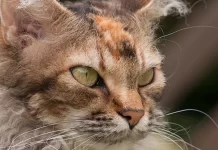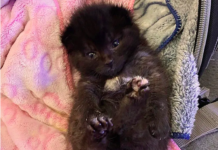Last Updated on September 6, 2023 by Fumipets
Key Information about Heart Murmurs in Cats:
Heart murmurs in cats are abnormal sounds heard during a veterinary examination due to turbulent blood flow through the heart. They can range from benign to serious and often indicate an underlying heart condition.
Here’s a summary of key information about heart murmurs in cats and answers to common questions related to them:
-
Causes: Heart murmurs in cats can be caused by various factors, including congenital heart defects, acquired heart diseases, or other medical conditions.
-
Grading: Veterinarians grade heart murmurs on a scale from I to VI, with I being the softest and VI the loudest. The grade helps assess the severity of the murmur.
-
Symptoms: Cats with heart murmurs may not display any symptoms, especially in the early stages. As the condition progresses, symptoms like coughing, labored breathing, lethargy, and poor appetite may appear.
-
Diagnosis: A veterinarian can diagnose a heart murmur through a physical examination and may recommend further tests such as echocardiography, chest X-rays, or blood tests to determine the cause and severity.
-
Treatment: The treatment for heart murmurs in cats depends on the underlying cause and the cat’s overall health. It may involve medication, dietary changes, or lifestyle modifications.
Heart Murmurs in Cats
Our beloved cats’ health problems aren’t always the most openly discussed. Unfortunately, heart illness is one of their hidden killers. A cardiac arrhythmia in animals is one potential sign of it. A murmur isn’t always an issue, though, and sometimes it’s not even a sign of heart illness. Let’s elaborate on what heart murmurs in cats mean.
What Is a Heart Murmur?
It’s not common to discover heart sounds, which are the sound of chaotic blood movement. The blood should circulate freely and uniformly through the heart’s various compartments. When that doesn’t happen, like when a heart valve is leaking, blood is pushed against gravity and swishes with arriving blood, causing agitation and sound.
The severity of that sound is rated by veterinarians on a range of 1-6, with 6 being the most intense. According to the Cummings School of Veterinary Medicine at Tufts University, there are four different categories of cardiac murmurs:
Grade 1: After about two minutes, vets hear a ‘swishing’ sound while listening to the heart of a calm cat in a quiet room.
Grade 2: The faint sound of a heart murmur is apparent right away.
Grade 3: This heart murmur is considered medium-intensity.
Grade 4: Vets detect a loud murmur.
Grade 5: This strong murmur often produces what’s referred to as a ‘thrill’—a vibration vets feel on a cat’s chest.
Grade 6: Considered quite uncommon, this heart murmur in cats can be heard without a stethoscope.
Depending on where they detect the murmur in the cardiac cycle—constantly, systolically (when the heart muscle contracts and pushes blood into the vessels), or diastolically—your veterinarian may characterize it. (when the heart muscle relaxes and the chambers fill with blood).
Without a stethoscope and a skilled ear, you won’t be able to hear the cardiac sound as a pet caregiver.

What Causes Heart Murmur in Cats?
Here, a comprehensive veterinarian examination will hold the key to solving this puzzle. Evans claims that cardiac sounds are merely a possible indicator that something may be wrong with the heart and not the issue itself.
Cardiomyopathies, or disorders of the heart muscle, are another name for structural anomalies. Feline Hypertrophic Cardiomyopathy (HCM), the most prevalent, frequently results in chronic heart failure. Breeds that are genetically predisposed to HCM include:
- American shorthair
- British shorthair
- Chartreux
- Maine coon
- Norwegian forest cat
- Persian
- Ragdoll
- Some Rex cats
- Sphynx
Heart sounds in cats can occasionally be signs of conditions other than heart disease, such as:
- Hyperthyroidism
- Obesity
- Pregnancy
- Extreme thinness
- Anemia
Murmurs could also be brought on by worry and stress. It is possible for cats to have a condition known as a “dynamic right ventricular outflow tract obstruction,” or DRVOTO, which results in an innocuous cardiac sound that is usually only audible when they are under duress. Their heart is healthy; it’s just pumping rapidly and strongly, which results in the sound, which usually goes away when they settle down again.
Signs and Symptoms of Heart Murmur in Cats
The signs of your cat’s cardiac arrhythmia are frequently precursors to other medical issues. A normal doctor visit includes listening to your pet’s pulse; if anything is found, a conversation is then opened.
However, your cat may exhibit some of the following symptoms of HCM or cardiac failure:
- Difficulty breathing
- Decreased appetite
- Weakness
- Collapse
- Inability to use their back legs
When cats don’t exhibit heart sounds, some veterinarians may advise a diagnostic blood test to look for serious heart disease. It is known as a proBNP screening. I advise sending a blood test that contains the proBNP before administering anesthetic to any cat in order to more effectively screen for silent cats who have serious cardiac disease.
What’s the Outlook? Future Prognosis for Cats With Heart Murmurs
A cat’s life span can be up to two years after they have entered heart failure, according to Evans, depending on the root reason and the severity of the heart condition.
However, if the source of the cardiac arrhythmia is innocuous, like DRVOTO, it shouldn’t have any negative effects on the patient’s quality or amount of life. To know what to anticipate, make sure to frequently transport your pup or cat to the veterinarian.
Common Questions about Heart Murmurs in Cats:
Are heart murmurs in cats always a cause for concern?
Not necessarily. Some heart murmurs in cats are benign and may not require treatment. It’s essential to consult a veterinarian for a proper diagnosis and guidance.
Can heart murmurs be prevented in cats?
Congenital heart murmurs cannot be prevented, but you can reduce the risk of acquired heart diseases by providing proper nutrition and regular veterinary care.
Can cats with heart murmurs lead normal lives?
Many cats with heart murmurs can lead relatively normal lives with proper management and treatment. The prognosis depends on the underlying condition’s severity.
Is it safe to breed cats with heart murmurs?
It is generally not recommended to breed cats with heart murmurs, as these conditions can have a genetic component that may be passed on to offspring.
How often should cats with heart murmurs be monitored by a veterinarian?
Cats with heart murmurs should be regularly monitored by a veterinarian, and the frequency of check-ups will depend on the severity of the condition and the treatment plan.
https://www.youtube.com/watch?v=xcTaMc9KAVA


















